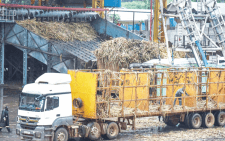Economy expanded by 5.4pc in second quarter

Kenya’s economy witnessed a robust expansion of 5.4 per cent in the second quarter of this year, outpacing last year’s growth rate of 5.2 per cent during the same period.
The key driver behind this acceleration was a remarkable turnaround in the agriculture sector, which recorded an impressive growth of 7.7 per cent, marking its fastest pace since 2020.
“The quarterly gross domestic product (GDP) report shows the overall and sectoral performance of the economy. From the start, the economy is estimated to have grown by 5.4 per cent during the second quarter of 2023 compared to 5.2 per cent in the same quarter of 2022,” data from Kenya National Bureau of Statistics (KNBS) shows.
It indicates the surge in the agriculture sector played a pivotal role in propelling overall economic growth, compensating for a slowdown in other sectors.
“Notably, all economic sectors experienced growth, albeit at a slightly subdued pace, including manufacturing, electricity and water supply, construction, accommodation, transport and storage, as well as finance and insurance,” KNBS said.
A critical factor contributing to the resurgence of the agriculture sector was the improvement of weather conditions, bringing an end to a two-year cycle of drought.
The statistics showed that the favourable weather conditions significantly boosted agricultural production, with noteworthy growth observed in the production of tea, coffee, vegetables, fruits, and milk.
Tea production, for instance, surged by an impressive 15.2 per cent, reaching 155,500 tonnes, while coffee exports experienced a robust increase of 13.7 per cent, reaching 18,900 tonnes in the second quarter of 2023. Similarly, there was an upswing in the volumes of fruit and vegetable exports, along with increased milk intake by processors.
The growth in agricultural production not only bolsters the country’s economic performance but also has positive ripple effects on employment and livelihoods, particularly in rural areas where agriculture is a primary source of income.
Specific setbacks
Despite the overall positive trend, there were specific setbacks noted in the production of cut flowers and sugarcane during the period under review. Sugarcane deliveries witnessed a significant decline, plummeting to 1.25 million tonnes from 2.156 million tonnes in the quarter ending June 2022.
Meanwhile, the volume of Kenya’s tea exports shrunk by 18 per cent in the first seven months of 2023 as compared to the same period in 2022 as some key markets kept off the products due to the tough economic environment globally, the Tea Board of Kenya (TBK) said on Friday.
The TBK said in an industry report released in Nairobi, that export volumes stood at 224,807 tonnes, a decline from 274,830 tonnes in a similar period in 2022.
Russia, Sudan, and Iran are some of Kenya’s main markets that have maintained low participation in the country’s tea auctions or kept off altogether, according to the institution.
Between January and July, for instance, the TBK said Russia bought a paltry 8 tonnes of Kenyan tea, while Sudan and Iran absconded from auctions during some months.
“The global recession, which is largely attributed to the effects of the Russia-Ukraine crisis, and the recent armed conflict in Sudan has affected tea exports in major markets,” the TBK said. The situation for the East African nation has further been worsened by declining prices of the cash crop in the global market.












